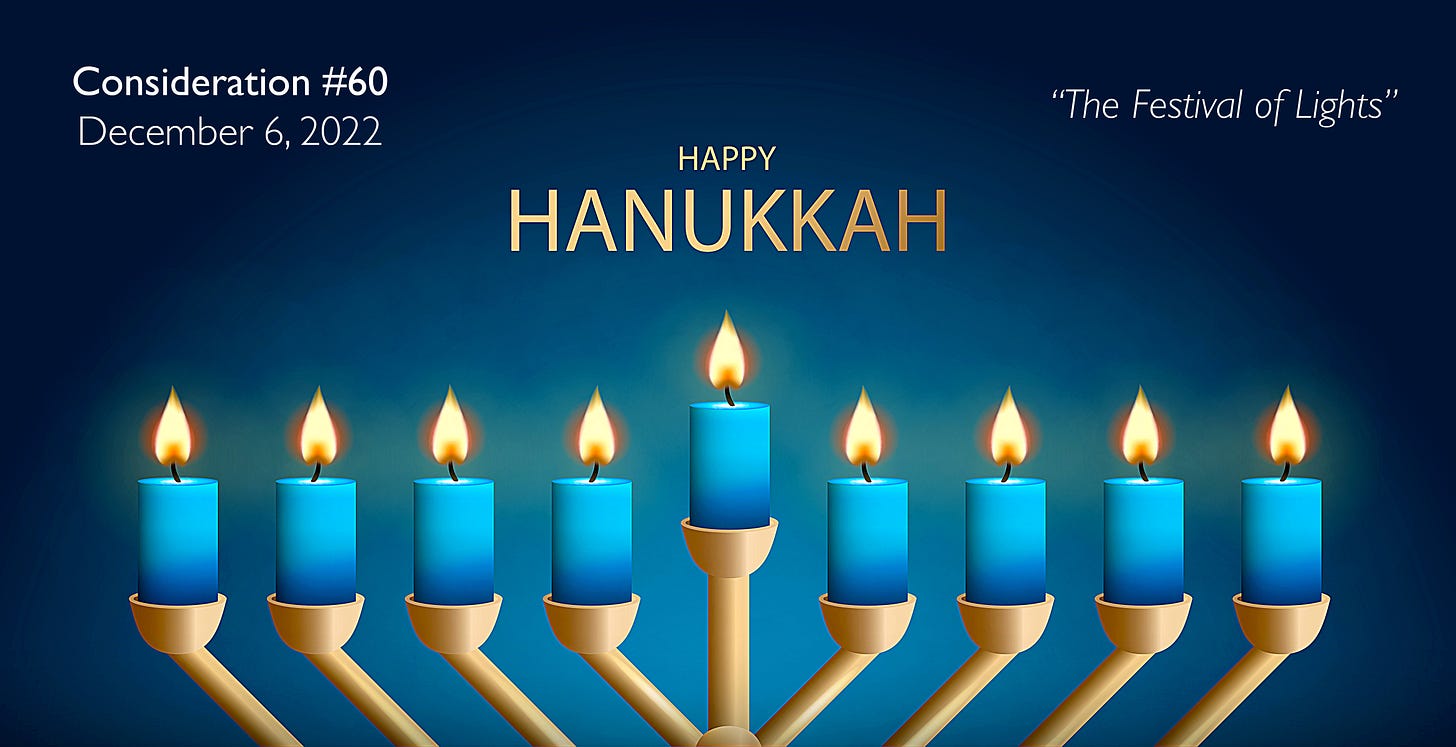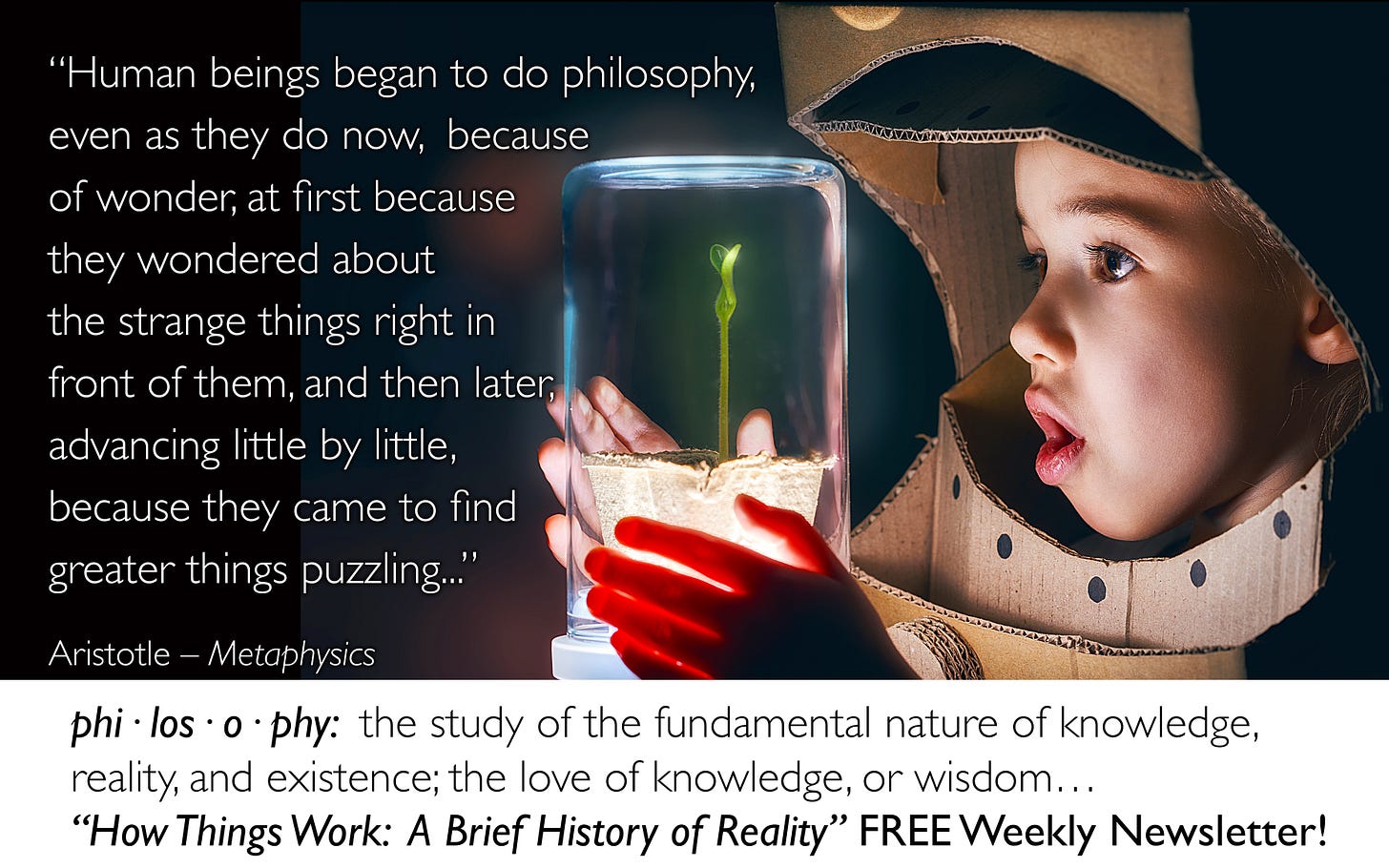How Things Work: A Brief History of Reality
SPECIAL HOLIDAY EDITION: Consideration #60 "Hanukkah – The Festival of Lights"
Be A Part of the Conversation!
Tuesday, December 6, 2022
"When we share something material, we are left with less of what we started. But currencies of spirit, elements such as light, love and knowledge, defy these physical conditions—they increase as they are shared and become eternal. On Chanukah when we use one flame to light another, the glow is not halved – the light is multiplied."
—Micaela Ezra
PREFACE
Happy Holidays Everybody!
What exactly do we mean, when we say, “Happy Holidays?” In the United States the “Holiday Season” begins in late November with Thanksgiving and ends on January First, which is New Year’s Day. December 25, or Christmas, is generally considered the “focal point” of the legal Holiday Season. Thanksgiving, Christmas, and New Year’s Day are all federal holidays. However, another “major” holiday that occurs during the traditional Holiday Season includes the Jewish celebration of Hanukkah.
“It has something to do with menorahs, candles, and dreidels; and they get gifts every night for eight nights.”
Most Americans “know” that Hanukkah occurs “around Christmas.” However, few Americans understand what the holiday is about. It has something to do with menorahs, candles, and dreidels; and they get gifts every night for eight nights. If you are a Catholic, your Bible contains the story of Hanukkah. However, if you are a Protestant, Baptist, or any denomination based on the “King James” version of the Bible, your Bible is missing this story. Unlike the Catholic, Greek Orthodox, and the “Apocrypha,” the “King James” version of the Bible does not contain the books of the Maccabees.
This year, Hanukkah occurs from the evening of December 18 through the evening of December 26. So, this week we will consider the holiday of Hanukkah.
CONSIDERATION #60 – Hanukkah: The Festival of Lights
Hanukkah, sometimes referred to as the “Festival of Lights,” is actually considered a “lesser” Jewish festival. However, because it usually falls within the traditional “Holiday Season” it has the feeling of a larger holiday, like Christmas, to many non-Jews. Starting on the 25th day of Kislev on the traditional Jewish calendar, it generally falls in December on the modern calendar. The Hebrew word “Chanukah” literally means “dedication.” It commemorates the rededication of the Second Temple in Jerusalem in 165 BCE by the Maccabees after its occupation and desecration by the Syrians.
Here is how that event is described by History.com. (https://www.history.com/topics/holidays/hanukkah)
“The events that inspired the Hanukkah holiday took place during a particularly turbulent phase of Jewish history. Around 200 B.C., Judea—also known as the Land of Israel—came under the control of Antiochus III, the Seleucid king of Syria, who allowed the Jews who lived there to continue practicing their religion. His son, Antiochus IV Epiphanes, proved less benevolent: Ancient sources recount that he outlawed the Jewish religion and ordered the Jews to worship Greek gods. In 168 B.C., his soldiers descended upon Jerusalem, massacring thousands of people and desecrating the city’s holy Second Temple by erecting an altar to Zeus and sacrificing pigs within its sacred walls.
Under the leadership of Judah Maccabee, a successful revolt against the Syrians allowed the Jews to regain access and control of the Temple in Jerusalem. Jewish Law mandated that the Temple be cleansed and rededicated to God. Part of that rededication involved the lighting of the menorah. This is how History.com describes the importance of the menorah in this rededication.
“Judah called on his followers to cleanse the Second Temple, rebuild its altar and light its menorah—the gold candelabrum whose seven branches represented knowledge and creation and were meant to be kept burning every night.”
However, the olive oil used to light the menorah had been polluted by the Syrians and only a small amount of “usable” olive oil remained for the rededication. Once re-ignited, it was important that the menorah remained lit “forever.” It would take at least eight days to prepare a new batch of “purified” olive oil to use in the Temple; and they only had enough for one day. This is when the “miracle” of Hanukkah takes place. This is how History.com describes it:
“According to the Talmud, one of Judaism’s most central texts, Judah Maccabee and the other Jews who took part in the rededication of the Second Temple witnessed what they believed to be a miracle. Even though there was only enough untainted olive oil to keep the menorah’s candles burning for a single day, the flames continued flickering for eight nights, leaving them time to find a fresh supply. This wondrous event inspired the Jewish sages to proclaim a yearly eight-day festival.”
During Hanukkah, people of the Jewish faith light a candle in their menorah every evening for eight evenings. According to History.com, the menorah continues to remain the “centerpiece” of the Hanukkah celebration.
“The Hanukkah celebration revolves around the kindling of a nine-branched menorah, known in Hebrew as the hanukiah. On each of the holiday’s eight nights, another candle is added to the menorah after sundown; the ninth candle, called the shamash (“helper”), is used to light the others. Jews typically recite blessings during this ritual and display the menorah prominently in a window as a reminder to others of the miracle that inspired the holiday.”
Even the traditional foods related to Hanukkah revolve around the idea of “oil” in that they are all fried in oil! Including favorites such as fried potato pancakes called latkes and a fried jelly-filled donut called a sufganya.
In an article entitled “What is Hanukkah?” from Chabad.org, it is suggested that the flickering flames of candlelight from the menorah has a message for all of us:
(The word “God” is not completely spelled out, in keeping with Jewish tradition)
Noting that one should spend time in close proximity to the Chanukah lights, the Previous Rebbe would say, “We must listen carefully to what the candles are saying.” So what are the flickering flames telling us? Here are some messages:
a. Never be afraid to stand up for what’s right. Judah Maccabee and his band faced daunting odds, but that didn’t stop them. With a prayer on their lips and faith in their heart, they entered the battle of their lives—and won. We can do the same.
b. Always increase in matters of goodness and Torah-observance. Sure, a single flame was good enough for yesterday, but today needs to be even better.
c. A little light goes a long way. The Chanukah candles are lit when dusk is falling. Perched in the doorway, they serve as a beacon for the darkening streets. No matter how dark it is outside, a candle of G‑dly goodness can transform the darkness itself into light.
d. Take it to the streets. Chanukah is unique in that its primary mitzvah is observed in public. It’s not enough to be a Jew at heart, or even at home. Chanukah teaches us to shine outwards into our surroundings with the G‑dly glow of mitzvahs.
e. Don't be ashamed to perform mitzvahs, even if you will feel different. Rather, be like a menorah, proudly proclaiming its radiant uniqueness for all to see.
The common usage of the term “mitzvah” often connotes a “good deed” or “righteous act” such as charity or helping others directly. In essence, when the practitioner of Judaism lights the menorah, they are sharing the “light of God” with you, which is a kind of mitzvah.
POSTSCRIPT
It seems almost natural that a Festival of Lights would be a part of our traditional “Holiday Season.” In the United States the entire Holiday Season often appears to be a Season of lights. There is something magical about Christmas lights and candle lights that bring color, warmth, and a flickering joy to our traditional Holiday Season. Even the end of the Season, New Year’s Day, is celebrated with fireworks across the world. Human beings love light. Hanukkah is a celebration of light; and a meaningful part of America’s traditional “Holiday Season.”
"This is the season when people of all faiths and cultures are pushing back against the planetary darkness. We string bulbs, ignite bonfires, and light candles. And we sing."
—Anita Diamant
Next week we will consider another celebration focused on the lighting of candles; the newest, and first “modern” holiday that has been added to the American “Holiday Season,” Kwanzaa.
Expand the Conversation by Upgrading to “Reality by a Thread!”
Excerpt from Tomorrow’s FREE SPECIAL HOLIDAY EDITION of Untangling the Knots of Reality – Podcast #26: “It’s A Wonderful Podcast: Untangling Self-Sacrifice & Unanswered Prayers."
This Two-Part Holiday Podcast is my gift to All Subscribers – Happy Holidays Everybody! Look for it in your mailbox tomorrow…
This Week on “The Thread”:
•Untangling the Knots of Reality FREE SPECIAL HOLIDAY PODCAST – Part Two, “It’s A Wonderful Podcast: Untangling Self-Sacrifice & Unanswered Prayers” (“In It’s A Wonderful Life, Capra proposes, that God does not answer prayers by solving our problems; God answers prayers by making us aware that our experience of Reality is the ultimate answer to our prayers. Like George Bailey, we essentially choose our reality through our decisions, choices, and actions. Sometimes we forget that. Our life, as we experience it, is the answer to our prayers; the question is do we recognize it or not?
In the end, God does not solve George Bailey’s crises; Clarence just allows George to see the truth of his own experience, or reality, and that, it was the reality that “he” chose for himself. Once George realizes this truth, and the consequences stemming from it, he fully understands that the life he was about to throw away really was A Wonderful Life after all…” )
•Reality by a Thread (Discussion Thread): Preview of Book V – “The Arch of Human Consciousness & Awareness:” “It is a ‘direct recognition’ and understanding of how quantum reality works. It is a direct experience of how Reality functions ‘outside of time and space.’ Einstein once said that the reason we have time is so that ‘everything doesn’t happen all at once.’ At this point, it is critical to understand that there is no inherent reason for time except one: we cannot experience the state of existence known as “Becoming” all at once. The empirical world of experience only makes sense within the limits of time. However, the rational world of experience only makes sense outside the limits of time. The reality we experience as ‘Becoming’ is a combination of both...”)
•FREE PDF Download of Book IV: “The Cosmic Symphony – Overtones of String Theory” plus other discounts and benefits.
UPGRADE NOW!
Simple, Unique, and Inexpensive Holiday Gift Ideas from “HOW THINGS WORK!”
Give unique and thoughtful gifts that your friends and family will not forget by New Year’s Eve!
GIFTS UNDER $10: PDF Downloads of my books make an excellent “last minute” holiday gift, particularly for those living far away. PDF files can be shared on a flash-drive or emailed instantly anywhere. And no postage!
Click for PDF Downloads from BooksNotOnAmazon.com
GIFTS UNDER $20: Deluxe Print Editions of my books make great gifts for your most unique friends and family members. However, printed books must be processed, packaged and shipped, so order early for the Holidays. There’s a lot of “supply-chain” issues this year!
Click for Deluxe Print Editions from Blurb.com
New & Now Available! – CLICK IMAGE to learn more…








